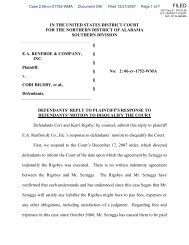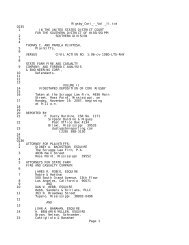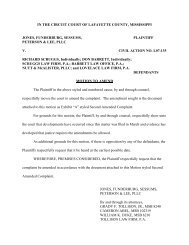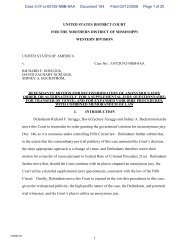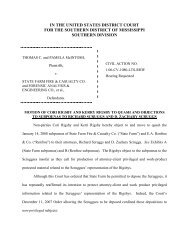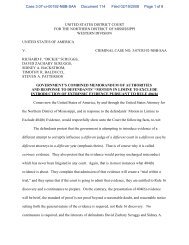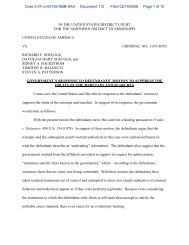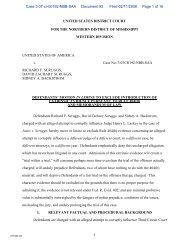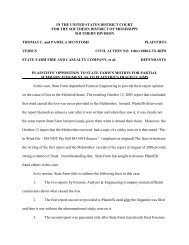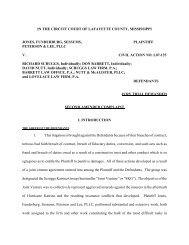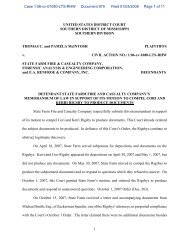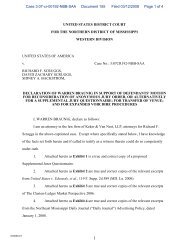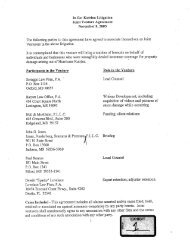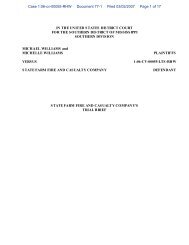Here's a copy of the State Farm brief - Insurance Coverage Blog
Here's a copy of the State Farm brief - Insurance Coverage Blog
Here's a copy of the State Farm brief - Insurance Coverage Blog
Create successful ePaper yourself
Turn your PDF publications into a flip-book with our unique Google optimized e-Paper software.
Thus, in McIntosh, this Court held that <strong>the</strong> SKG lawyers were jointly responsible for<br />
Scruggs’s ethical breaches under MRPC 5.1(c) because <strong>the</strong>y took no action to stop <strong>the</strong><br />
“consulting” payments to <strong>the</strong> Rigsbys. (McIntosh [1172] at 3.) Similarly, in In re Conwell, <strong>the</strong><br />
court held that an attorney violated his affirmative duty and suspended him from practice<br />
because after he became aware <strong>of</strong> a partner’s ethical violation, he merely “discussed <strong>the</strong> matter”<br />
with his partner (“who assured him” that <strong>the</strong> violation would be corrected), but <strong>the</strong> attorney<br />
“failed to take any action” to remedy <strong>the</strong> violation. In re Conwell, 69 P.3d 589, 591 (Kan. 2003).<br />
In this case, Counsel admit that, when <strong>the</strong>y learned <strong>of</strong> Scruggs’s sham payments to <strong>the</strong><br />
Rigsbys, <strong>the</strong>y made no effort to stop <strong>the</strong> conduct or to end <strong>the</strong>ir relationship with Scruggs or <strong>the</strong><br />
Rigsbys. Ra<strong>the</strong>r, <strong>the</strong>y merely informed Scruggs that <strong>the</strong>y would not pay <strong>the</strong> Rigsbys directly and<br />
<strong>the</strong> payments made by Scruggs should not be charged back to any <strong>of</strong> <strong>the</strong> qui tam lawyers. ([141-<br />
4] 16.) This halfhearted attempt to object to this arrangement is tantamount to a ratification <strong>of</strong><br />
Scruggs’s actions and is woefully inadequate to discharge <strong>the</strong>ir pr<strong>of</strong>essional responsibilities.<br />
Tellingly, <strong>the</strong> Rigsbys’ <strong>brief</strong>s do not address this Court’s discussion <strong>of</strong> MRPC 5.1(c) at<br />
all. In fact, <strong>the</strong> BFRG <strong>brief</strong> completely ignores MRPC 5.1(c), quoting a separate provision <strong>of</strong> <strong>the</strong><br />
rule – MRPC 5.1(a) – which is not relied upon by <strong>State</strong> <strong>Farm</strong> and has nothing to do with <strong>the</strong><br />
issues in this case. ([141] at 15.) The GBM <strong>brief</strong> is similarly devoid <strong>of</strong> substantive analysis.<br />
Instead, it accuses <strong>State</strong> <strong>Farm</strong> <strong>of</strong> “tr[ying] to muddy <strong>the</strong> waters by citing inappropriate cases such<br />
as American Can Co. v. Citrus Feed Co., 436 F.2d 1125 (5th Cir. 1971),” which it claims is<br />
“about as relevant to <strong>the</strong> present dispute as <strong>the</strong> Uniform Commercial Code.” ([140] at 17-18.)<br />
Yet in McIntosh, this Court specifically cited American Can for precisely <strong>the</strong> same proposition<br />
that <strong>State</strong> <strong>Farm</strong> relied upon in its <strong>brief</strong>. (McIntosh [1172] at 3.) Clearly, <strong>the</strong> Court found<br />
American Can both appropriate and relevant.<br />
Unable to <strong>of</strong>fer any tenable legal argument justifying <strong>the</strong>ir failure to comply with MRPC<br />
5.1(c), Counsel attempt to explain it away. First, <strong>the</strong>y argue that this case is distinguishable from<br />
McIntosh because “in this case <strong>the</strong> Rigsby’s [sic] are not fact witnesses but are clients <strong>of</strong> <strong>the</strong> law<br />
firms [and] parties.” ([141] at 6.) But Counsel concede that payments to clients and to qui tam<br />
2



